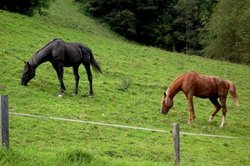Horse Breed: Holding an Arab?
The Arab is a very beautiful and noble horse, often the dream of many riders. If you want to buy a representative of this horse breed, you should think carefully beforehand whether you can meet his requirements. In some respects, keeping them appropriately is a little more complicated than keeping other robust horse breeds.

General information about the Arabs
- The Arab is one of the oldest and noblest horse breeds in the world and is bred absolutely pure. Just Horsesthat are bred on the Arabian Peninsula and whose ancestors have also been proven to have been drawn back there for many generations, may be referred to as thoroughbred Arabs. All other Arabs belong to a division within Arab breeding.
- This breed of horse has adapted to the toughest living conditions. De animals come with barren Lining and can do without water longer than other representatives without losing performance.
- They are extremely fast and persistent, and accordingly require a lot of exercise as a riding horse.
- This breed is rather small with a height of 140-156 cm.
- They have a very pretty, pike-shaped head, a naturally arched neck with a beautiful top line, a short back and very clear and dry legs and joints. The animals like to carry their tails up when they are in motion.
- All coat colors are represented, but the typical color of this horse breed is the white of the gray horse.
- This fur is very fine and silky soft, even in winter these animals are not immediately able to develop a very thick winter coat, which is why they first have to be covered in native locations. However, this can change after a long period of acclimatization.
Most expensive horse breed - facts
The price for a horse varies a lot. There is a breed of horse known as the ...
Thoughts on keeping this breed of horse
- In general, these horses, like the representatives of all other breeds, should be kept in a species-appropriate manner with plenty of free space and in community. There is nothing worse for an Arab than being locked up in a box or even a rack all day.
- Keep in mind that although these horses are very robust, this applies to the climatic conditions of the Arabian Desert. They get by on sparse forage, which is why it is more detrimental to them if they can uncontrollably fill their stomachs with juicy and nutritious grass all day.
- The animals have to be kept as herd animals in a community, isolation would damage the psyche and health.
- Not all representatives can cope with a lot of moisture, they need opportunities to shelter.
- The hooves of this breed of horse are designed for dry and hot ground; it is not good for them to spend long periods of time standing in deep mud.
- Since they are also extremely intelligent, they always need enough work for their heads too, they have to be kept busy. Otherwise, they quickly get stupid thoughts and begin to be very interested in the terrain outside of their pasture.
This is how you manage the posture
- It is best to keep an Arab in an open stable. Here he can freely decide whether he wants to go to the pasture or prefer to retreat to the warm or cool stables in summer.
- You should hurry away from the pastureland and, if necessary, divide it up with mobile fence parts so that your horse cannot fill its stomach in an uncontrolled manner.
- Provide a watering facility where the animals can always find fresh water.
- Consider this breed's intelligence. Make sure that the area is adequately secured for keeping it open so that your horse can neither injure itself nor break out following its curiosity.
- Don't leave him without work for long periods of time, these animals need employment. You should ride daily, practice lessons, or go off-road.
- Even then, a daily check of the hooves is necessary when you are not going to ride come.
- As the days get colder, keep an eye on fur growth as it can It may be possible that you have to cover your Arab with a rainproof winter blanket for the winter.
This is arguably the nicest way to hold an Arab, if you consider all of the aspects listed.
How helpful do you find this article?


